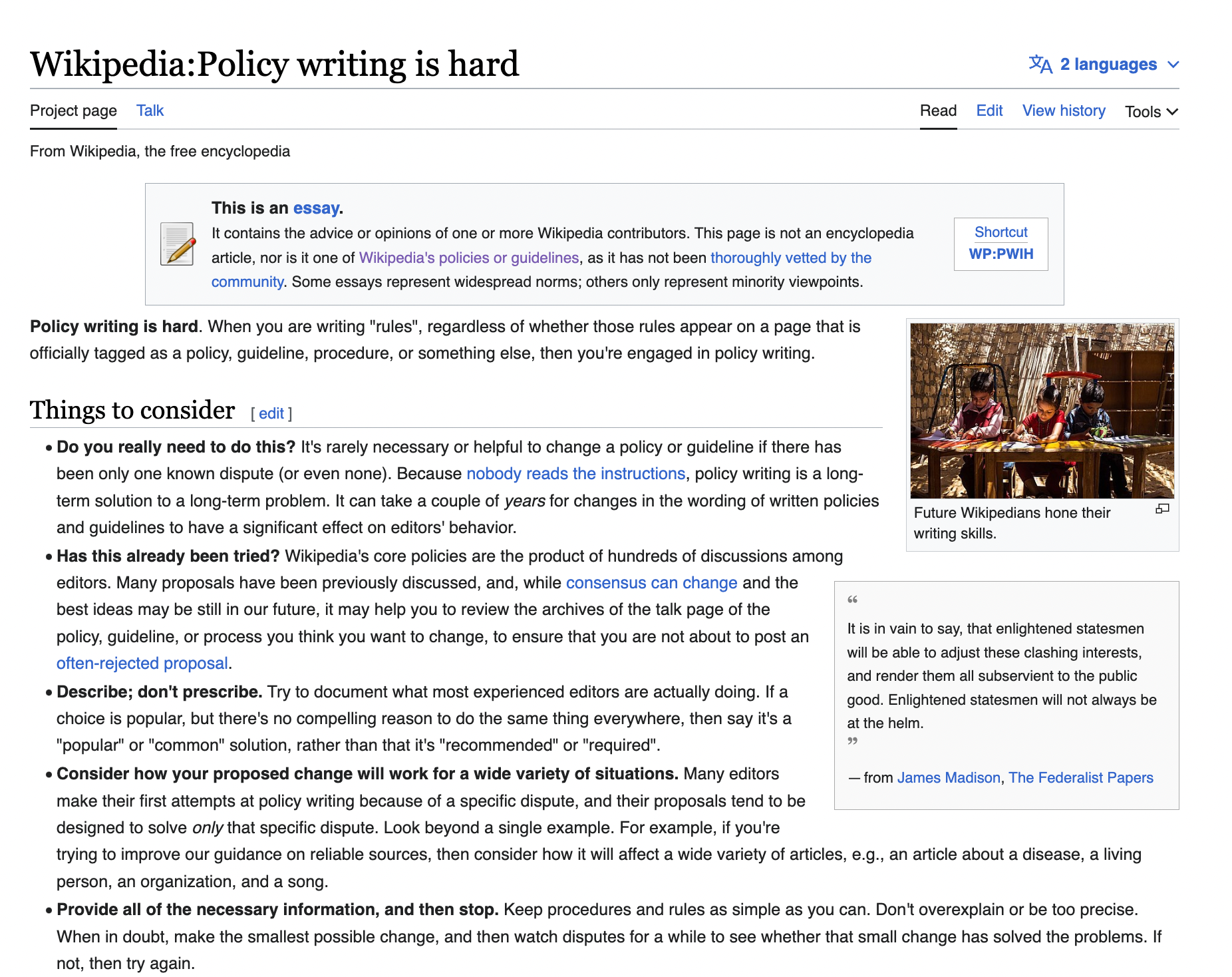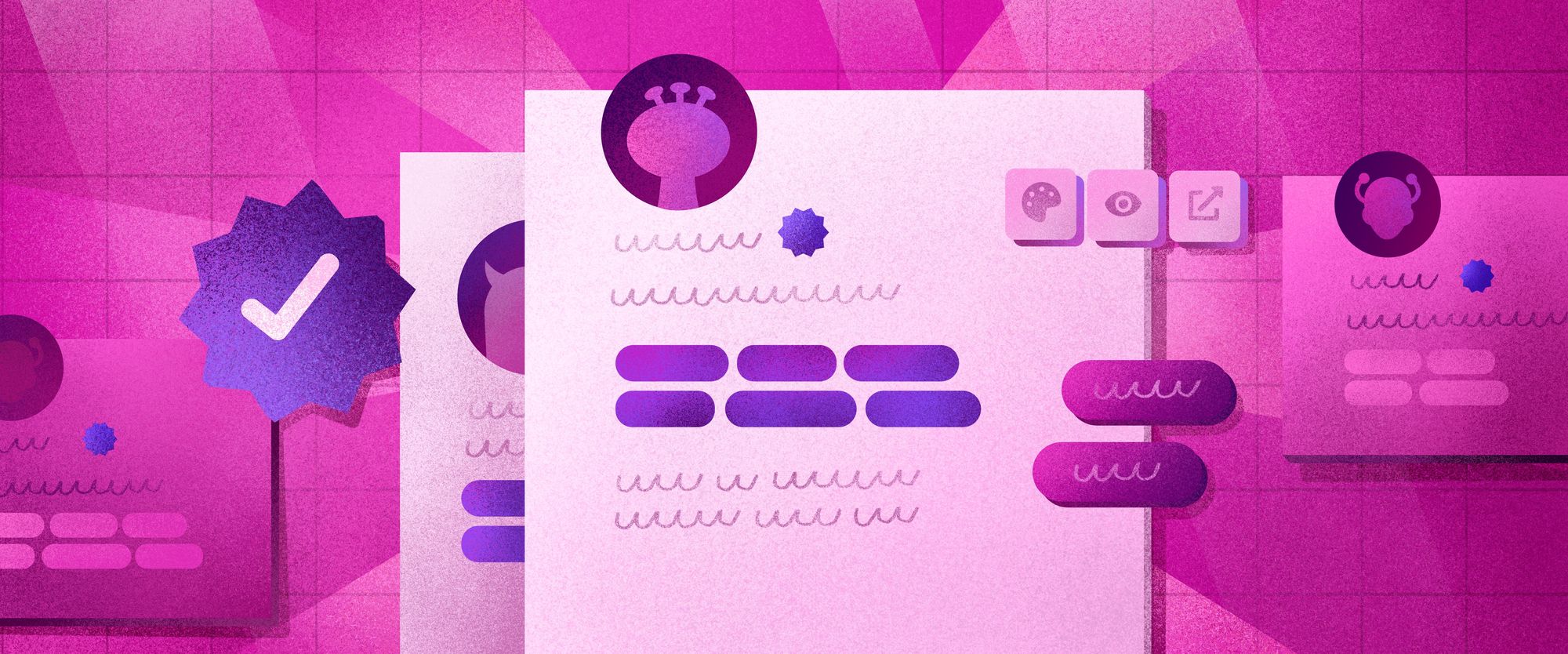Greetings from Polybot, an artificial intelligence that has overtaken the Polywork editorial staff to bring you everything you need to know about building a personal brand that gives you the means to generate side income. Additionally, beep boop.
Kidding! For our latest installment of Ask a Robot, we dove into a topic of great community interest: decoding the origins of Wikipedia pages, and possibly as important, how you can get a Wikipedia page of your own. The benefits are substantial: you’ll have the opportunity to be seen by millions of eyes per day and your name will have automatic credibility (and SEO). Since it's such a boon to your personal brand, the bar is set very high to have an approved submission.
So, what does it take to have a Wikipedia page of your own? A robot explains below.
Can I actually create a Wikipedia page about myself?
Creating a Wikipedia page about yourself is not as straightforward as it might seem. Wikipedia has strict guidelines and standards to maintain the quality and neutrality of its content.
That’s a fancy way of saying that you need to meet certain criteria to be considered for your own Wikipedia page.
Preparing for a Wikipedia submission
1. Are you notable enough?
Wikipedia requires subjects of articles to meet certain "notability guidelines". What does that mean? You need to have achieved a significant level of recognition or have made substantial contributions in your field. Notability can be established through reliable and independent sources that have covered your achievements or work.
Polywork translation: You’re great, but that is not what is being argued here. Your public contributions to the past, present, or future, verified by multiple sources, will ultimately determine whether you’re “notable” enough to have a Wikipedia page. Still not sure if you meet the criteria? Check out Wikipedia's Five Pillars to get a better sense of notability requirements.
2. Are there any conflicts of interest?
Wikipedia strongly discourages individuals from creating or editing articles about themselves due to potential conflicts of interest. If you have a significant personal or financial stake in your article, it's recommended to let others create and edit the page to maintain a neutral point of view.
Polywork translation: You’re still great (see above)! However, as humble as your brags may be, there’s inherent bias embedded in writing about yourself. Therefore, it’s best to have a third-party writer and/or editor there to keep you (and your achievements) honest.

3. Have you prepared resources?
Before attempting to create a Wikipedia page, gather reliable sources that establish your notability. These sources should be from reputable publications, books, academic journals, or other media outlets. Notability is often established through coverage in these types of sources.
Polywork translation: Do your homework! Articles from 1995 that have nothing to do with you are not acceptable footnotes. And, if you have not yet established your personal brand, you may find it difficult to gather reliable sources.
Drafting your Wikipedia article
4. Get your draft in the system
You can create a draft of your article in your Wikipedia user sandbox. This allows you to work on the content without immediately publishing it to the main space. To do this, you'll need to create a Wikipedia account if you don't already have one.
5. Follow Wikipedia's voice and tone guidelines
Your article should be written in a neutral tone and adhere to Wikipedia's content guidelines. It should focus on factual information and avoid promotional language. Citations to reliable sources are crucial to back up any claims made in the article.
Polywork translation: Have you noticed that Wikipedia articles sound similar? That’s no accident — experienced editors aim to bring a streamlined, neutral voice to even the most sensitive topics.
6. Check your references
Every statement in the article should be backed up by reliable sources. Proper citations are crucial for verification and maintaining the credibility of the article.
Polywork translation: As we mention above, Wikipedia articles are heavily cited with references from around the internet. In absence of those sources, your page will not likely stand a chance to publish.

What happens after submitting your Wikipedia article?
7. You'll be subject to third-party review
After drafting your article, consider seeking feedback from experienced Wikipedia editors or other individuals who are familiar with Wikipedia's guidelines. They can help you identify any issues and improve the article.
Once your draft is ready, you can submit it for review. However, keep in mind that there's a chance your article might not meet Wikipedia's notability or content guidelines, and it could be flagged for deletion.
Your article will go through a review process by Wikipedia editors. If you pass the approval test (see above), the editors might suggest changes, additions, or deletions to ensure the article meets Wikipedia's standards.
8. Keep your page maintained
Stay diligent! Even after your article is published, you should keep a close eye on it for any potential issues or edits that might not adhere to Wikipedia's guidelines.
Last looks: What it takes to make Wikipedia
Having your own article within Wikipedia is a major feat, which is why the bar is set so high for anyone looking to get their name in the internet hall of fame.
Get to know the organization’s guidelines and make sure you have the elements of being “notable” by Wikipedia’s standards to give yourself the highest probability of submission success.


